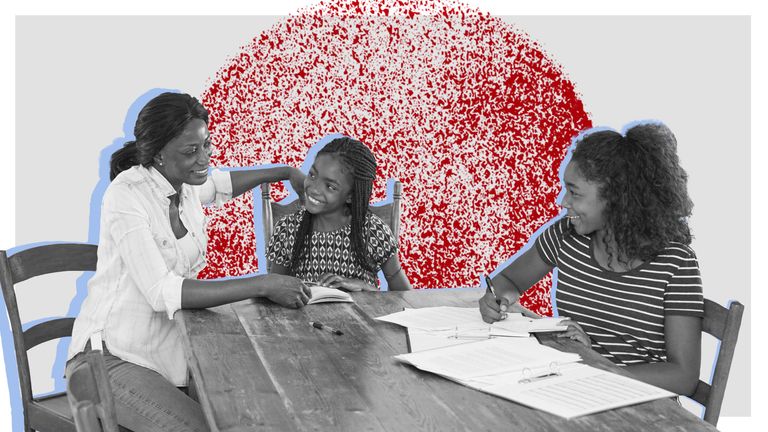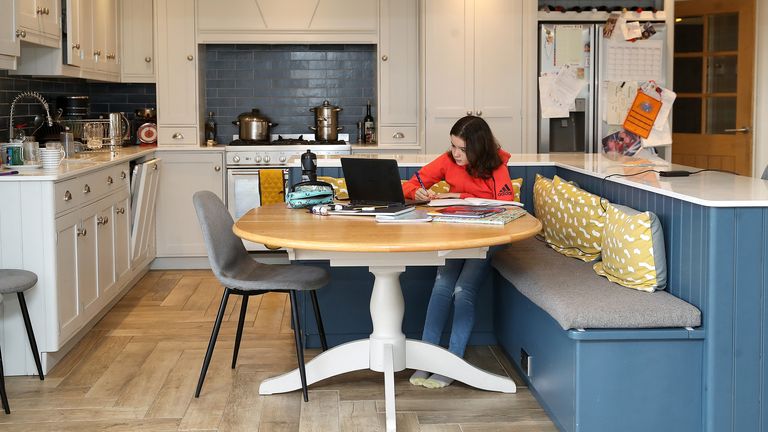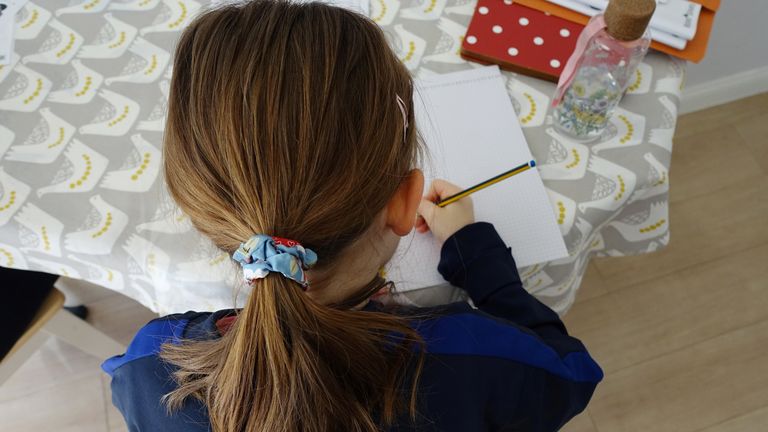COVID-19 homeschooling? Five ways to keep your kids learning, happy and healthy
Some parents will be looking for ways to keep the kids entertained as well as continuing their learning.
Monday 4 January 2021 21:23, UK
With more pupils unable to return to school due to the worsening coronavirus pandemic, some families are working on ways to keep their children's education going at home.
All of London's primary schools and a number in the surrounding areas will remain closed until 18 January - while uncertainty continues across other parts of the country with some switching to online lessons.
Despite government claims schools are safe, unions continue to voice safety concerns and scientists have called on ministers to "look very carefully" at the return of pupils.
Tom Rose and Jack Pannett are qualified teachers and sports coaches and run an activity business that helps children learn.
Here, they set out their five top tips on how to keep your kids engaged, learning, healthy and happy if they have to remain at home instead of at school because of the coronavirus...
1. Plan and prioritise: The core subjects
If you're not a teacher by trade, give yourself some realistic goals - trying to conquer the whole curriculum is probably going to make you and your child anxious (especially if you're juggling your work and this new teaching role).
Prioritise the core curriculum - maths and English. We are firm believers that your best is enough.
There are lots of ways to cover the rest of the curriculum and you can get creative with these, for example, watching Horrible Histories or Blue Planet is a great way to cover some of the humanities. And don't worry, Ofsted won't be calling anytime soon.
You don't need to reinvent the wheel. There is an abundance of free online resources, as well as those that your child's school will probably send you.
Instead, prioritise and plan what you're going to cover, and do your best to execute your plan. Like any new job, the first few days will be about finding your feet.
2. Opening your new school
Welcome to your new school - make yourself at home! It's time for you to meet your new pupils.
We find that with the children we work with, starting with "why" is key. It helps the children understand the purpose of the task and enables them to understand why they're being asked to do it.
Each household's "why" will be different: it could be "because when we go back to school, we need to be up to date with the learning," but just make sure you don't use "because I said so, or you're grounded".
After starting with "why" we give the children an element of choice: we've found this to be a brilliant motivator. An immediate decision they could make is to give their new school a name and design its badge.
Then, once they've done this, you can begin to have a discussion with them about what's going to be included in the curriculum. Spoiler alert: it's primarily maths and English.
Include your children in the discussion around the different topics you cover and when you're going to do so.
Now you've managed to get your new class on board, it's time to set some school rules. This could include phone use, use of calculators, rules on talking over one another and reinforcing the "absolutely no children in the staff room" rule. Ever!
3. Fresh start: Establish routines
From our experience, children and adults react well to structure, especially a morning routine. Get out of your PJs and put on your new school uniform.
Try to design the learning schedule together and if possible, allocate a specific work space for your new class - their new classroom. This way they can primarily associate this space with their learning and will find it easier to switch off when in other areas of the house.
To try to maintain some links to their usual school experience, consider setting break and lunch times. You don't need to install a bell for this, but if you're feeling lavish, a whistle will suffice.
Make sure you take into consideration any of your work commitments that may affect this if you aim to align your work with their learning time.
There will be ample opportunity in the evening for some downtime and being firm on breaks will help to reinforce the value of learning time.
If you can co-ordinate this time with other "schools" (families), the children could regain some of the social elements by communicating with others and having some virtual playtime.
4. Tips on teaching core subjects
When you were at school, who was your favourite teacher? Remember them? Even if you can't, this is your opportunity to be THAT teacher. Try to see it from your child's perspective: this will shape a lot of your decision-making and allow you to optimise their learning experience.
Champion progress. Fortunately, your class is small. This is a great opportunity for your children to not have to compare themselves with their peers. Instead, they can focus on doing their best and beating their own scores.
A great way to monitor progress and understanding is by flipping the classroom dynamic. After you've covered a topic, swap over the pupil/teacher roles and get the children to teach you what they've learned.
This is another opportunity to give them choice: they can plan their lesson and teach it however they want. Additionally, if they use a computer to plan their lesson, without knowing it you're forging cross-curricular links. Look at you go! (No, you cannot have a pay rise).
A good teacher is reflective. Stubbornness is different to being firm. If things aren't working out, don't be harsh on yourself or your class.
Try it and then feel free to tweak down the line if need be. This is your opportunity to inspire your children and foster a love of learning.
5. You can't pour from an empty cup
As you will find out, teaching can be a stressful job. It's not the cliche eight-week-holiday dream that you were mis-sold by the careers adviser. Staff and pupil well-being is now in your hands.
The school canteen needs to have brain healthy foods where possible, such as fruit and veg, lots of water and avoid sugar.
Exercise is something we'd advise should take place early in the school day to get your class energised, but not fatigued. If they've forgotten their PE kit, don't be too harsh, just don't forget to bring this up at parents' evening.
A good teacher also leads by example, so remember to put plans in place to take care of your staff too. Take time to relax, have a varied and balanced diet and partake in physical exercise.
In the past, we have found journaling, meditation and breathing exercises all to be very useful for reducing stress.
These steps have really helped us to maximise our teaching ability and stay positive when times are tough. Remember: you can't pour from an empty cup.
It's the dream job you never expected. Stay positive, don't be too harsh on yourself or your class, and remember... your best will be enough.
Tom Rose and Jack Pannett's website is here
Their Instagram is here







